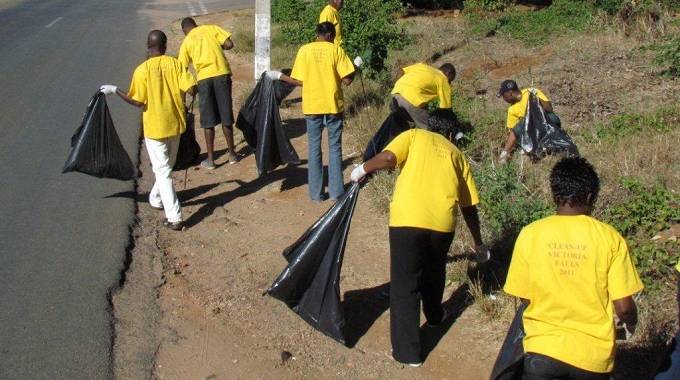CHEGUTU – COMMUNITIES should make cleaning up of their environments an
everyday activity and not only wait for the National Clean-Up campaign day.
The National Clean-Up campaign was launched in 2018 and five years later, the
practice should be part of everyday activity of Zimbabweans, with results being
evident in cities, towns and rural business centres.
President Emmerson Mnangagwa launched the National Clean-Up campaign in
December 2018, basing it on moral persuasion and urging all citizens to clean up
their environments every first Friday of every month.
The benefit of the campaign is to help reduce pollution and waste in the
environment. Against the backgrounds of threats from climate change, the clean-up
campaign also raises awareness about the importance of keeping the planet clean
and health, reducing pollution, preserving the biosphere, protecting endangered
species, while helping to preserve the earth’s natural resources.
By cleaning up litter and other types of waste, communities can prevent them from
entering waterways and harming wildlife and polluting the air. Community
participation in the country-wide programme promotes long-term positive change,
forcing people to think about changing their behaviour. Keeping public areas clean
promotes health and hygiene in public spaces and prevents and controls the spread
of communicable diseases, while maintaining a sanitary environment for the public.
And last week stakeholders showed that they are heeding President Mnangagwa's
call to action that there should be no compromise to service delivery as they take
steps in fight against cholera.
In this regard, Chegutu councillors were tasked to assist in working on removing the
hotspot cholera tag for Chegutu District.
This came out during a District Water and Sanitation Sub-committee (DWSSC)
workshop. DWSSC members were concerned about the repeated mention of the
cholera outbreak as having started in Chegutu.
Although largely true, the councillors said statements such as this had however
created a negative impression of Chegutu as a district.
The workshop equipped the DWSSC stakeholders with knowledge on coming up
with a district WASH Master plan that speaks to WASH activities both for urban and
rural communities.
Timothy Fred from the Rural Infrastructure Development Agency, RIDA, (formerly
DDF), highlighted that all councillors should be able to know all WASH assets life
cycle costs – that is the initial cost, service cost, planning and maintenance costs,
operating costs, and disposal cost of all WASH activities in their wards.
He said that it is imperative for communities to know how much a borehole costs,
and at what point in time it is going to be replaced, the costs of solar panels, solar
pumps and so forth, and when to replace them as this gives them a sense of
ownership and appreciation for the assets in their wards.
The WASH Master planning is guided by NDS1 on the national level and by SDGs
on a global level. He advised DWSSC members to deliver district WASH Master
planning and make people enjoy WASH services. The district should never be called
a cholera hotspot area but be a cholera-free district, he stressed
In response, the Chegutu Rural District Council chairman for Social Services,
Councillor Charles Mugwagwa, said: "I accept the challenge brought up by Mr Fred
and within this five-year term, the negative tag on Chegutu District will be a thing of
the past.”
The seminar comes just at the right time – soon after President Emmerson
Mnangagwa launched a blue print called A call to action, no compromise to service
delivery: First stage of interventions to modernise the operations of Local Authorities
towards a 2030 Vision."
Councillor Mugwagwa encouraged all local authorities not to tolerate any issues that
will derail them from providing good service delivery for a cholera- free country.
He thanked development partners, WeltHungerHilfe (WHH) and Farm Community
Trust of Zimbabwe (FCTZ), who organised the workshop together with the
Government in a bid to provide WASH services to communities.
He called upon all stakeholders and development partners to support WASH
activities.
Rural communities are encouraged to construct toilets. They are further advised to
have clean homesteads that have refuse pits, pot racks, handwashing facilities that
people use after visiting the toilet.
The handwashing facilities can be easily made from plastic bottles popularly known
as “chigubhu gear” or tippy-tap in rural areas where buckets with taps may be
expensive for some community members. They are also encouraged to practise
waste management by separating waste that decomposes from waste that does not
decompose, such as plastic bottles, and to liaise with the Environmental Health
Officers in their respective wards on how they can generate money from plastic
bottles and cans. – Rural Communication Services



